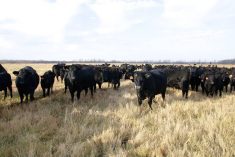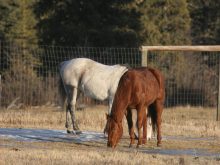It is interesting that a specific topic — like global warming — can become all encompassing.
Before we know it, deadlines are established and parameters are set, even with a one-sided view of the whole situation.
Ruminants have been targeted in the global warming realm because of their methane production, which is a byproduct of the digestive process. Many research dollars have been spent on making this system more efficient.
The great news is that researchers are looking for answers to this without downgrading other livestock parameters that are already efficient.
Read Also

Beef cattle more prone to trace mineral deficiencies
The trace mineral status of our cows and calves is a significant challenge for western Canadian producers and veterinarians.
I am sure methane production was not discussed when 80 million bison roamed the Great Plains as the dominant ruminant herbivore. And not to be the naysayer here, but I wonder how global warming was affected by the record number of hectares burned across Canada this last summer.
Let me be clear. This was nobody’s fault and was not under our control. Similarly, ruminants blow off and belch methane gas and it is not their fault. Many argue that cattle utilize lots of land for grazing that is unsuitable for other cropping and cattle also convert grass into protein.
We know that many species of wildlife are more abundant than 50 or 100 years ago because of plentiful forage from farming or ranching practices. If cattle were removed from the land tomorrow, wildlife species would become even more abundant so the methane issue would still exist.
Even with responsible hunting, wildlife overpopulation is the result. Then we have too many elk wandering out of Suffield, Alta., and Kananaskis country and into neighboring farmland.
As producers, we all live with wildlife in various degrees and it is fine, in moderation. But if numbers get too high, there is increased disease transmission and more problems from predators.
I snicker when I say this, but I haven’t seen a study on wild ruminants and their contribution to global warming. Also, how are bison included in this discussion, when they still fall under the wildlife category in British Columbia?
Many research dollars have been allocated to study ways to decrease methane emissions in beef and dairy cattle and slow the global warming resulting from agriculture. Well-intended researchers may discover more ways to make cattle even more efficient and yet have no detrimental effects on anything else.
Some good could come out of this. Dairy researchers have already found a milk test that can identify the lower and higher methane producing cows. If this is tied to production, it should be good thing.
As long as milk production, disease resistance and reproduction aren’t sacrificed, it could reduce methane production.
We have selected cattle to grow faster, convert better and yield higher, so the productivity per acre of land has increased, and that has reduced the carbon footprint per pound of beef. Feed savings and water savings are huge on these more efficient cattle.
Various feed supplements to reduce methane emissions have also been studied, but do these have to be fed when cattle are at pasture and what is the cost? Also, will any reductions be permanent or will there be adaptive changes and more methane produced again? If there are other efficiencies measured, they might justify the cost of the supplements.
There is progress, but let’s not rush into changes until we see evidence of benefits from lower methane production in cattle. There must be no detrimental effects to other parameters.
We are in good hands as researchers worldwide come to grips with this. They are tying the issue of methane production and global warming into other research already under way.
Just as research in the oil and gas sector finds efficiencies, so too will research in farm animal production. Results Driven Agriculture Research and other funding organizations can guide us through this time and help agriculture collectively feed the world.
Will the European Union finally recognize the efficiencies of growth implants in reducing the carbon footprint and amount of methane produced per pound of beef raised? There are lots of questions and hopefully more answers down the road.
Roy Lewis works as a veterinarian in Alberta.















